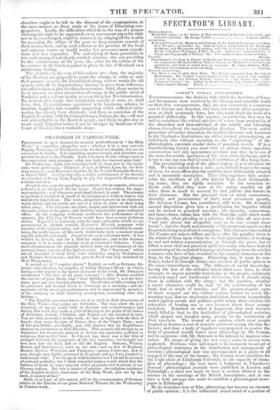ORATORIOS IN PASSION-WEEK.
PERMISSION to open theatres for musical perforntances in " the Holy Week " is something altogether new : whether it be a step towards Popery, Puseyism, or Presbyterianism, we shall not inquire, nor are we competent to decide. It is something unprecedented, and therefore can portend no good to the Church. Lord CHARLES JAMES always used to discountenance such attempts : what new light has dawned upon him? On Wednesday night, two oratorios, both of them new to the multi- tude, were performed,—Mcnm.'s Jeseph, at Drury Lane, by the Ger- man company ; and HANDEL'S Jephtha, by the Sacred Harmonic Society, at Exeter Hall. Anticipating only a single performance of the former, we attended at Drury Lane, hoping to pay our respects to HANDEL on a future occasion.
Joseph is not, properly speaking, an oratorio ; for an oratorio, although a drama, is not designed for the stage. Joseph was written for stage- representation ; and whenever performed abroad, is acted. The attempt to perform it curtailed of much of its dialogue, and without scenes, was manifestly injudicious. The work, altogether operatic in its character, wants these ; and its merits are not of a kind to allow of their being taken away. The choruses are short, simple, and interwoven with the dramatic action of the piece ; and therefore unsuited for mere orchestral effect. As the company evidently meditated the performance of an oratorio, Der Tod Jesu of GRAUN would have been a more judicious choice. Regarded in Germany with the same estimation which we are accustomed to cherish towards HANDEL'S Messiah, pregnant with beauties of the highest order, and in some respects unrivalled in excel- lence, the performance of this work would have been a musical repast equally grateful and novel. Joseph is not even a German work : it was written in French, and for a Parisian audience ; and to the German company it is as much a foreign work as Cacercifs Palestine. Under such circumstances, the pleasure derived from the performance of this pastoral drama was not of the highest order. The " Rornanze," which are all beautiful of their kind, were admirably sung by HAITZINGER and Madame SCHUMANN ; and the part of Jacob was ably sustained by Herr MELLINGER.
A second act of " popular pieces," English as well as German, fol- lowed—the selection, we suppose, of Acting Manager BUNK: in which, having a due regard to the sacred character of the week, Mr. Prnierrs vociferated " The best of all good company " ; Miss ROMER warbled the sorrows of poor Marie, who " died faithful to love " ; and the Ger- mans gave out two hunting-choruses. The libretto of this evening will be preserved and handed about in Germany as a curiosity ; and the mysteries of the evening's performance will be expounded by members of the company to their admiring countrymen, something after this fashion- " The English, you must know, are very rigid in their observance of the Holy Week : stage-plays are forbidden. But they allow the per- formance of sacred music both in theatres and concert-rooms ; and during this week they make a point of singing to the praise of all classes of divinities, Jewish, Christian, and Pagan—all are invoked in turn. You see that, according to this book, we had to begin with the God of Israel ; then came the turn of Diana ; then of the Virgin Mary ; next of Isis and Osiris ; and finally, you will observe that an Englishman chanted an invocation to God Bacchus. This seemed odd enough to us ermans ; but we cannot pretend to fathom the mysteries, political or religious, that we find here. In this act, too, there was a fair trial of strength between the composers of the two countries : we brought our best men into the field, and so did the English. MOZART, WEBER, SPORE, and BEETHOVEN, were on our side ; and on that of England, ROMER, HAWES, WITHERS, and Prrns.res,—names, I dare say, new to yon, though very highly esteemed in England, and yet I am puzzled to understand why. I would speak with hesitation lest I should be accused of national partiality, but I think impartial judges would admit that the balance of merit in some respects rather preponderated in favour of our German authors. But this is matter of opinion : the religions tolerance of the English in their observance of the Holy Week, you see by the book, is matter of fact."
Such, or at least of this nature, will be the commentaries of German critics on the libretto of our great National Theatre for the Wednesday in Passion-week.


























 Previous page
Previous page